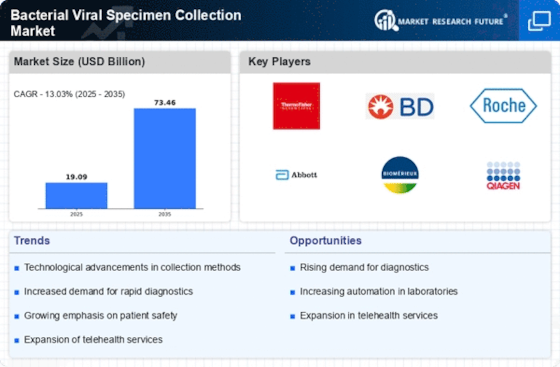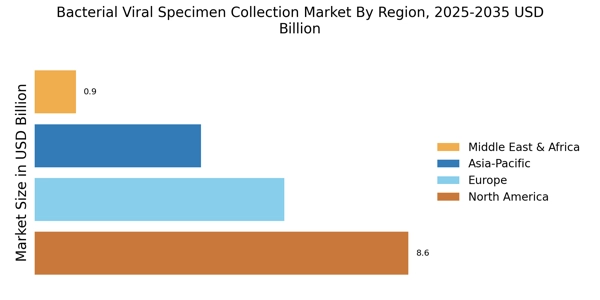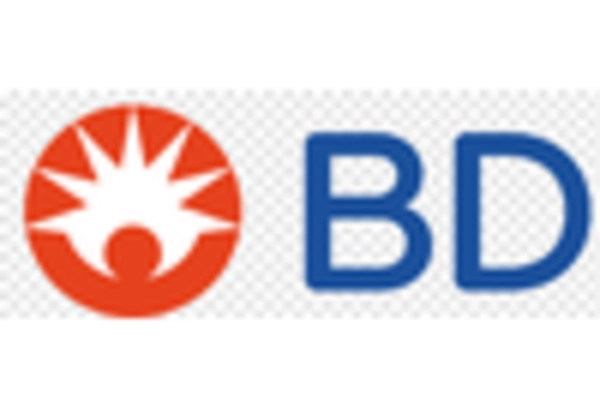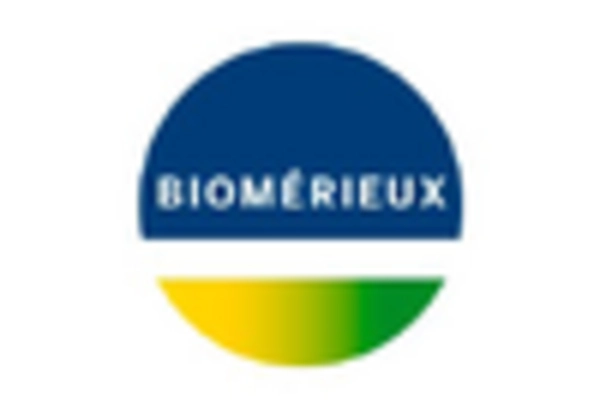Expansion of Diagnostic Laboratories
The expansion of diagnostic laboratories is a key driver for the Bacterial Viral Specimen Collection Market. As healthcare systems evolve, there is a growing need for specialized laboratories that can handle a wide range of tests, including those for bacterial and viral infections. This expansion is likely to lead to an increase in specimen collection activities, as more facilities are equipped to process and analyze samples. Additionally, the rise of point-of-care testing is contributing to this trend, as it necessitates efficient specimen collection methods. The proliferation of diagnostic laboratories is expected to create new opportunities within the Bacterial Viral Specimen Collection Market, fostering innovation and growth.
Growing Awareness of Infectious Diseases
The rising awareness of infectious diseases is significantly influencing the Bacterial Viral Specimen Collection Market. As populations become more informed about the transmission and impact of bacterial and viral infections, there is a corresponding increase in the demand for effective testing solutions. Public health campaigns and educational initiatives are driving this awareness, leading to higher rates of specimen collection for diagnostic purposes. The market is projected to expand as healthcare systems respond to this demand by enhancing their specimen collection capabilities. This trend indicates a potential increase in the volume of specimens collected, thereby positively impacting the Bacterial Viral Specimen Collection Market.
Regulatory Support and Standardization Efforts
Regulatory support plays a crucial role in shaping the Bacterial Viral Specimen Collection Market. Governments and health organizations are increasingly emphasizing the need for standardized collection protocols to ensure the reliability of test results. This push for standardization is likely to enhance the quality of specimens collected, thereby improving diagnostic accuracy. Regulatory bodies are also providing guidelines that facilitate the adoption of best practices in specimen collection. As a result, the market is expected to benefit from increased trust in testing processes, which could lead to a rise in demand for specimen collection services. The alignment of regulatory frameworks with industry standards is anticipated to foster growth in the Bacterial Viral Specimen Collection Market.
Technological Innovations in Specimen Collection
The Bacterial Viral Specimen Collection Market is experiencing a surge in technological innovations that enhance the efficiency and accuracy of specimen collection. Advanced devices, such as automated collection systems and mobile health applications, are being integrated into clinical practices. These innovations not only streamline the collection process but also improve patient compliance and data accuracy. For instance, the introduction of smart collection devices has been shown to reduce contamination rates significantly. Furthermore, the market is projected to grow at a compound annual growth rate of approximately 7% over the next five years, driven by these technological advancements. As healthcare providers increasingly adopt these innovations, the Bacterial Viral Specimen Collection Market is likely to witness substantial growth.
Increased Investment in Healthcare Infrastructure
Increased investment in healthcare infrastructure is significantly impacting the Bacterial Viral Specimen Collection Market. Governments and private entities are allocating resources to enhance healthcare facilities, which includes upgrading specimen collection processes. This investment is likely to improve the overall efficiency of healthcare delivery, including the speed and accuracy of specimen collection. Enhanced infrastructure can facilitate better training for healthcare professionals, leading to improved specimen handling and processing. As healthcare systems become more robust, the demand for reliable specimen collection methods is expected to rise, thereby driving growth in the Bacterial Viral Specimen Collection Market.

















